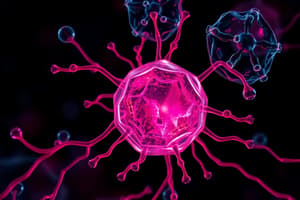Podcast
Questions and Answers
What is the basic unit of life?
What is the basic unit of life?
- Organ
- Molecule
- Tissue
- Cell (correct)
What process do plants use to convert light energy into chemical energy?
What process do plants use to convert light energy into chemical energy?
- Metabolism
- Photosynthesis (correct)
- Cellular Respiration
- DNA Replication
Which of the following is NOT a level of biological organization?
Which of the following is NOT a level of biological organization?
- Species (correct)
- Organisms
- Molecules
- Organ Systems
Which of the following domains includes unicellular organisms?
Which of the following domains includes unicellular organisms?
What maintains stable internal conditions in an organism?
What maintains stable internal conditions in an organism?
Which biological process involves the creation of proteins?
Which biological process involves the creation of proteins?
Who introduced the concept of evolution through natural selection?
Who introduced the concept of evolution through natural selection?
What is the sum of all chemical reactions in an organism?
What is the sum of all chemical reactions in an organism?
Flashcards are hidden until you start studying
Study Notes
Overview of Biology
- Biology is the study of life and living organisms.
- It encompasses various fields including:
- Botany (study of plants)
- Zoology (study of animals)
- Microbiology (study of microorganisms)
- Ecology (study of ecosystems)
- Genetics (study of heredity)
Levels of Biological Organization
- Molecules - the chemical building blocks of life.
- Cells - the basic unit of life.
- Tissues - groups of similar cells performing a specific function.
- Organs - structures composed of different tissues.
- Organ Systems - groups of organs working together.
- Organisms - individual living entities.
- Populations - groups of the same species living in a specific area.
- Communities - different species living together in an area.
- Ecosystems - communities and their physical environment.
- Biosphere - the global sum of all ecosystems.
Key Concepts in Biology
-
Cell Theory:
- All living organisms are composed of cells.
- The cell is the basic unit of life.
- All cells arise from pre-existing cells.
-
Evolution:
- The process by which species change over time through natural selection.
- Introduced by Charles Darwin.
-
Homeostasis:
- The maintenance of stable internal conditions in an organism despite external changes.
-
Metabolism:
- The sum of all chemical reactions in an organism that maintain life.
Major Biological Processes
-
Photosynthesis:
- Process by which plants, algae, and some bacteria convert light energy into chemical energy (glucose) using carbon dioxide and water.
-
Cellular Respiration:
- The process by which cells convert glucose and oxygen into energy (ATP), carbon dioxide, and water.
-
DNA Replication:
- The process of copying DNA prior to cell division.
-
Protein Synthesis:
- The creation of proteins based on the information encoded in DNA, involving transcription (DNA to mRNA) and translation (mRNA to protein).
Classification of Life
-
Domains:
- Bacteria - Prokaryotic, unicellular organisms.
- Archaea - Prokaryotic, often extremophiles.
- Eukarya - Eukaryotic organisms including animals, plants, fungi, and protists.
-
Kingdoms within Eukarya:
- Plantae
- Animalia
- Fungi
- Protista
Importance of Biology
- Understanding of life processes and ecosystems.
- Contributions to medicine, biotechnology, and environmental science.
- Insights into evolution and biodiversity.
- Applications in conservation and sustainability efforts.
Overview of Biology
- Biology examines life in all its forms and includes various subfields that study specific aspects of living organisms.
- Key fields include:
- Botany: Focus on plants and their processes.
- Zoology: Study of animals and their behavior.
- Microbiology: Investigation into microscopic organisms like bacteria.
- Ecology: Analysis of interactions within ecosystems.
- Genetics: Exploration of heredity and variation in organisms.
Levels of Biological Organization
- Biological complexity is structured in a hierarchy from molecules to biosphere:
- Molecules: Chemical compounds essential for life.
- Cells: The fundamental unit of life.
- Tissues: Collections of similar cells that perform a common function.
- Organs: Structures formed from different tissues that carry out specific tasks.
- Organ Systems: Groups of organs that collaborate for essential biological functions.
- Organisms: Individual living entities, be it a plant, animal, or microbe.
- Populations: Groups of organisms of the same species in a defined area.
- Communities: Diverse groups of multiple species inhabiting a specific region.
- Ecosystems: Interfaces of biological communities and their physical environments.
- Biosphere: The global network of all ecosystems, encompassing the Earth's surface, air, and water.
Key Concepts in Biology
- Cell Theory:
- Asserts that all organisms consist of cells; it emphasizes the cell as life's basic structural unit and the continuity of cell division.
- Evolution:
- A principle introduced by Charles Darwin explaining species' adaptation and change over time through natural selection.
- Homeostasis:
- The mechanism by which living organisms regulate their internal environment to maintain stability despite external changes.
- Metabolism:
- Encompasses all biochemical processes that sustain life, including anabolism and catabolism.
Major Biological Processes
- Photosynthesis:
- Conversion of light energy into chemical energy, specifically glucose, carried out by plants, algae, and certain bacteria using sunlight, carbon dioxide, and water.
- Cellular Respiration:
- Process where cells break down glucose in the presence of oxygen to produce energy (ATP), carbon dioxide, and water.
- DNA Replication:
- The process of synthesizing an identical copy of DNA prior to cell division, vital for genetic continuity.
- Protein Synthesis:
- Formation of proteins using the genetic instructions found in DNA, involving:
- Transcription: Converting DNA into mRNA.
- Translation: Synthesis of proteins from mRNA templates.
Classification of Life
- Domains of Life:
- Bacteria: Unicellular prokaryotes, diverse in habitat and function.
- Archaea: Prokaryotic organisms known for thriving in extreme environments.
- Eukarya: Organisms with complex cells, which include:
- Plantae: Multicellular producers that perform photosynthesis.
- Animalia: Multicellular consumers with diverse forms and behaviors.
- Fungi: Decomposers that absorb nutrients from organic matter.
- Protista: A catch-all category for primarily unicellular eukaryotic organisms.
Importance of Biology
- Provides crucial insights into life processes, fostering understanding of ecosystems.
- Contributes significantly to fields like medicine, leading to innovations in treatment and prevention.
- Enhances knowledge of evolution and biodiversity, critical for scientific research.
- Supports conservation and sustainability initiatives aimed at protecting natural resources and habitats.
Studying That Suits You
Use AI to generate personalized quizzes and flashcards to suit your learning preferences.




